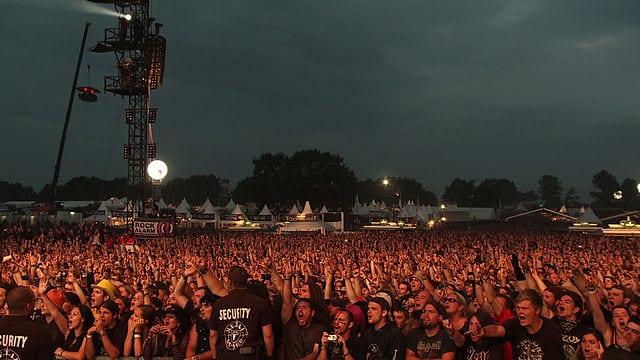Before the dust settled, before the grief started to subside after the tragic killing of 58 concert-goers in Las Vegas earlier this month, conversations around security and safety had already begun. Some called this insensitive; many call it imperative. As centers for entertainment have had their status as “soft targets” for acts of terrorism, what effect will it have on lovers of live music, and what will organizers do to prevent further tragedy in the future?
After the fatal shooting at Route 91 Harvest Festival, its organizers at Live Nation Entertainment released a statement that read: “To think that anyone would want to inflict harm on a gathering of music lovers is beyond our comprehension. And while we are stunned and grieving over this incomprehensible act of violence, we know that this is a moment when we must come together to prevent more tragedies like this from occurring.”
Others, however, were not so stunned. After all, this attack comes just months after a suicide bombing killed over 20 fans exiting an Ariana Grande show at Manchester Arena; 49 people were shot dead at Pulse, a dance club in Orlando, Florida in June 2016; 89 people were killed by three gunmen during an Eagles of Death Metal concert at the Bataclan theatre in Paris, France in November 2015. With relatively low levels of security and large crowds, these events have become a sadly common target by those seeking headlines with shocking acts of violence.
Concert organizers took notice of this influx of event anxiety immediately; most every concert and festival scheduled in the days that followed made an announcement about ramping up police presence and security measures, some artists cancelled shows, some venues offered refunds.
But just over a week post-Las Vegas, the conversation is up for discussion: will we, the concert-going public and those related to the industry, let the threat of an attack keep us from attending concerts for the rest of our lives? If so, where will it end? Will we stop going to movie theaters, classrooms, tourist attractions, any public place at all? What degree of security are we willing to take to avoid the possibility of attack? Stricter bag checks, or banning bags completely? Installing observation towers or hiring snipers? Closing down outdoor venues altogether?
Chris Robinette, CEO of Prevent Advisors, said that Vegas was “a nightmarish, sum-of-all-fears, worst-case scenario type of attack”. He doubts the attack could have been prevented, but notes that threats from places like adjacent buildings and balconies are “becoming a very, very relevant issue “. The Vegas gunman fired from the 32nd floor of a hotel overlooking the venue, separated by a major highway.
John Cohen, a counterterrorism coordinator at the U.S. Department of Homeland Security-turned-Rutgers Criminal Justice professor, said in an interview with NPR that, “It’s impossible to secure them [large gatherings] to the point when you can prevent any kind of violent attack, and still be accessible to the public”.
“You could build higher fences, screen people more extensively as they come in. You could’ve put more police inside and around the venue,” Cohen added. “And none of that would have stopped this attack.”
Robert C. Smith, a former police officer who now trains bouncers through his Nightclub Security Consultants firm, offers a different opinion to Billboard. “It took three clip magazine changes before a lot of people realized they were being shot at,” says Smith. “Trained sharpshooters would have recognized the sound of gunfire within seconds, located the source and sent precise rounds to take out the shooter.”
Another security expert- Paul Wertheimer, co-founder of Crowd Management Strategies- says takeaway from Vegas should be less about preventing any and all threats, and more about a system in place in case of attack. “The situation was made worse by the failure to attempt to evacuate people, and possibly save a life or two, or prevent injuries,” Wertheimer says. On the various cell phone footage recorded by those at Route 91, his first reaction: “No direction. No lighting. no pre-recorded message. Nothing to help the crowd find safe haven or shelter. Nothing was said, and 23,000 people were literally left in the dark as they were being shot at that. That’s what alarmed me.”
Clearly this attack at Vegas- which was the deadliest mass shooting in recent U.S. history- has sparked a complicated conversation surrounding concert security with a lot of differing opinions about best practices. However, there’s another conversation being had post-Vegas, and it’s one most experts in its field can agree upon.
Feeling anxiety after what happened in Vegas this month is perfectly normal. It’s normal to have hesitations; it’s normal to worry. It’s probably not best to rule out concerts or large gatherings altogether.
“In general, avoidance is probably not a good thing. It usually increases people’s anxiety and behavior over time,” Dr. Elana Newman, a professor of psychology at University of Tulsa, tells Billboard. “That said, if it’s overwhelming and you’re not going to be able to enjoy a concert, one should not go. But if it’s a small level of anxiety and there are reasonable reasons why it should be safe, then I think it’s advisable for people to try to live their lives as best they can”.
While statistics may not provide complete comfort, she adds that it is important to consider the reality of risk factor. “It’s horrific and it’s terrible. But that said, I think that the risks are fairly low”.
“I think the reality is that while we don’t live in a 100% safe world, we live in a mostly safe world for most people,” Dr. Newman says. “We have to make judgments, but constricting one’s life because of fears is not a healthy way to live.”
It would seem that music fans have had success in keeping this in mind. TheStreet reports that: “In the week following the shooting, Live Nation shares dropped just 1.7% following the shooting, a small reversal considering that the stock has gained 55% over the past 12 months”.
While Live Nation did cite the need to “prevent more tragedies like this” in the future, the nation’s prominent concert promotion company has not yet announced its concrete plans in a revised concert security strategy going forward.




